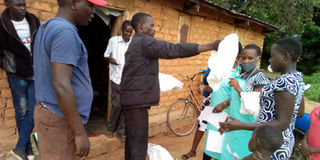Officials shun mosquito nets distribution over poor pay

Residents of Moruapesur receive mosquito nets from village health teams on July 11. PHOTO/GEORGE MURON.
The mass distribution exercise of government mosquito nets in the villages of Soroti District on Sunday came to a standstill officials protested the poor pay.
In the western division, Soroti municipality, the LC1 chairpersons, data clerks and village health teams laid down their tools and pitched camp at the division headquarters demanding explanation as to why payments varied per division.
Mr Gilbert Okello, data clerk, said the officers in charge of the malaria control programme are paying some officers Shs22, 000, while others are receiving Shs12, 000 yet they are being paid Shs8,000.
“These people are doing contrary things. At first, they said we would receive Shs20,000 for data clerks, Shs12,000 for safari day allowance and Shs10,000 daily transport facilitation which we have not received,” he said.
Mr Emmanuel Odochu, a village health trainer in Mutukula Cell in Soroti municipality, told Daily Monitor on Monday that the work is tedious yet they are given little facilitation.
He said they need transport and a lunch allowance.
“How do you expect us to work? You expect us to distribute six bales of mosquito nets which are carried from door-to-door at our expense,” Mr Odochu said.
Ms Safina Basinka, the monitoring and evaluation officer western division, said the ministry did not plan for lunches and door-to-door allowances.
She said they recruited at least a total of two data clerks, village health teams and one LC1 in every village.
Dr Elijah Ssemaganda, the assistant director health monitoring unit, said they are investigating a malaria control programme team in Teso over allegations of poor pay.
“I warned you on Friday, that your sub-county supervisors are trading contrary information. You must disclose proper information to the village officials distributing mosquito nets,” Dr Ssemaganda said.
“You should give the entire budget to the technical people and their leaders. These people are intelligent and they are not desperate, be open and give people information,” Dr Ssemaganda said.



